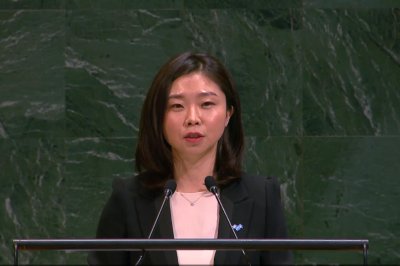
1 of 2 | North Korean escapee Kim Eun-joo spoke at a high-level U.N. General Assembly meeting on North Korean human rights Tuesday, warning that “silence is complicity.” Screenshot/UN Web TV
May 21 (UPI) — Activists, officials and defectors highlighted North Korean human rights violations at a high-level meeting of the United Nations General Assembly Tuesday, with many directly tying Pyongyang’s systemic abuses to its growing nuclear weapons and missile programs.
The meeting on the North’s human rights violations, the first of its kind held at the General Assembly, featured testimonies by two escapees who shared harrowing stories of oppression and implored the world to hold North Korean leader Kim Jong Un accountable.
“Silence is complicity,” said Kim Eun-joo, who was 11 years old when she fled with her mother and sister in 1999 to escape starvation in rural North Korea.
After crossing the Tumen River into China, Kim and her family faced years of human trafficking before finally making it to South Korea.
She pointed to North Korea’s military cooperation with Russia, particularly its deployment of troops to aid Moscow in its war against Ukraine, as a “new kind of modern-day slavery.”
“[The soldiers] have no idea where they are, whom they are fighting against or why,” she said. “Their lives have become a means for the Kim Jong Un regime to make money.”
Pyongyang has deployed around 15,000 troops to Russia, Seoul’s spy agency said last month. Some 600 of the soldiers have been killed and another 4,100 injured, the National Intelligence Service told lawmakers in a briefing.
Seoul and Washington also accused North Korea of supplying artillery and missiles to Russia. In exchange, Pyongyang is believed to be receiving much-needed financial support and advanced military technology for its own weapons programs.
Participants in the U.N. meeting highlighted the close link between North Korea’s human rights abuses and the regime’s growing arsenal.
“The regime preserves itself through producing nuclear weapons and ballistic missiles,” Greg Scarlatoiu, president and CEO of the Committee for Human Rights in North Korea, said.
“North Korea is no longer just a Korean Peninsula threat. The DPRK is no longer just a Northeast Asian threat,” Scarlatoiu said.
The Democratic People’s Republic of Korea is the official name of North Korea.
“The DPRK is exporting instability to the Middle East and to Europe,” Scarlatoiu said. “And the root cause of this is the human rights violations that the DPRK perpetrates.”
North Korean Ambassador to the United Nations Kim Song condemned the meeting, calling it a “burlesque of intrigue and fabrication” staged by “hostile forces” including the United States.
Kim also slammed the invitation of the North Korean escapees, calling them “the scum of the earth who don’t even care about their parents and families.”
Elizabeth Salmon, the U.N. Special Rapporteur on human rights in North Korea, told the General Assembly that North Korea has diverted resources toward militarization at the expense of human rights and basic necessities such as food, healthcare and sanitation.
“As the DPRK expands its extreme militarization policies, it exacerbates the extensive reliance on forced labor and quota systems, showing how peace, security and human rights are strongly interrelated,” Salmon said.
She added that North Korea’s border closures at the beginning of the COVID-19 pandemic in January 2020 worsened its human rights situation, as Pyongyang used the isolation to enact brutal new laws restricting access to information from the outside world.
A 2014 landmark U.N. Commission of Inquiry report documented North Korean crimes against humanity, including torture, rape, execution, deliberate starvation and forced labor, that were “without parallel in the contemporary world.”
South Korean Ambassador to the United Nations Hwang Joon-kook echoed calls to more closely tie North Korea’s human rights violations to its nuclear ambitions, which he said were “deeply interconnected.”
“For far too long the DPRK’s human rights violations have been overshadowed by its nuclear threats,” he said. “Their nuclear program is sustained by systemic repression, forced labor, diverted national resources and total control of its people.”
Hwang called North Korea “a real-life version of George Orwell‘s novel 1984.”
“However, the DPRK’s horrendous crimes do not stop at the border,” he said. “If human rights violations are stopped, nuclear weapons development will also stop.”